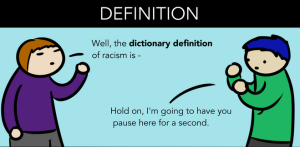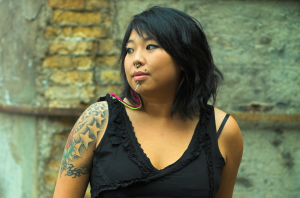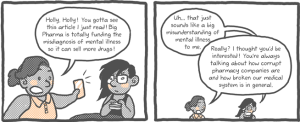In the mental health community, we place a lot of emphasis on healing. This is especially true for mentally ill people who are recovering from trauma.
And it’s for a good reason: we want one another to feel better, to cope better with pain, and to be happier.
But with all the emphasis on healing, it’s normal to sometimes feel frustrated with yourself when your healing process is taking forever.
This is especially true living in a capitalist society that equates our worth with our productivity. In this social context, we might feel that healing slowly means we’re less productive and thus less valuable.
As someone with PTSD and depression, I often get extremely frustrated at not getting better quicker. Traumas that are years and years old still affect me, and I get upset with myself for not healing from them.
The more I discuss trauma with other abuse survivors and mentally ill people, the more I realize I’m not alone in this.
When we feel this way, we need to tell ourselves that it’s okay to heal slowly.
But it’s easier said than done, and it’s something I still struggle to remind myself. Over years of hospitalizations and depressive episodes, I return to three basic reminders to comfort myself.
Here’s what I tell myself when it feels like my healing is going slowly:
1. Struggling Isn’t Failing – Healing Isn’t Linear
I recently went through a rough patch.
For the first time in months, I felt hopelessly sad and unmotivated. While I wasn’t at my worst, I couldn’t work and didn’t feel like doing chores or leaving the house – all characteristics of my worst depressive states.
The rough patch itself wasn’t that bad, but I was angry at myself for feeling sad. I groaned to myself: I thought I recovered. I thought I was doing so well.
To me, it felt like I had failed at healing.
The truth is that my “rough patch” didn’t cancel out the fact that I was coping really well for a few months.
It didn’t mean that I wasn’t doing well. It didn’t mean I wasn’t going to reach a place where I was happy again. Being angry at myself made the situation worse: On one level, I had to deal with the depression, and on another level, I had to deal with the intense anger.
After struggling with these feelings for a while, I eventually realized I needed to be more gentle and kind to myself. I didn’t have the energy to be angry, and I needed to channel the energy I did have into taking care of myself.
For a long time, I viewed every “dip” in my recovery – every suicidal episode, every rough day – as “starting back at square one.” It felt like every bad day cancelled out all the healing I’d done before that.
I was once told that healing isn’t linear. I hold onto those three words at times when I can’t get out of bed, or when every second reminds me of past traumas.
The reality is all these “dips” are a part of the process.
Encountering a traffic jam or having a busted tire doesn’t mean you’re never going to get close to your destination. It just means it’s going a little slowly, and you need a little extra tender, loving care!
You can go up and down, but you’ll always be moving forward. And as you move forward you’ll learn to cope better. You’re struggling to work through your traumas, which is a very normal human reaction to dealing with something difficult.
Struggling isn’t fun, but it’s not failure either.
Be patient with yourself. Remind yourself of how far you’ve come. Remember all the times you coped with things you didn’t think you could cope with. When you look at the bigger picture, you’re moving forward. That progress is worth celebrating, even on your rough days.
2. You’re the Only Person You’re Healing For
Plenty of mentally ill people – myself included – speak about their trauma and recovery in order to help others realize that healing is possible.
I appreciate people who speak openly about their trauma and recovery. Hearing others’ stories has helped me feel less alone, and it’s reminded me that things can get better.
But you don’t have to speak out about your trauma or recovery. Nobody has to do this.
If you’re not using your story to help or inspire others, you’re still a valuable member of the mental health community, and you’re still a valuable human being.
You don’t owe your recovery to anyone: not your family, friends, followers, other mentally ill people, or anyone else. You’re not recovering so you can be a productive cog in the capitalist system. You’re not recovering for your children or dependents.
Those who love you will obviously want to see you happy. So yeah, they’ll benefit from seeing you heal! But at the end of the day, you’re recovering for your own sake and nobody else. You should be your own first priority in this.
As someone who’s outspoken about their experiences with rape, I’m often called “inspirational” or “brave” by well-meaning people.
I think a lot of us feel the need to talk about our trauma in order to inspire and help others. Sometimes, this is because we’re reduced to our stories. This means we’re in an uncomfortable position where we feel that we have to heal for others instead of for ourselves.
When you remember that you don’t have to inspire others, it takes the pressure off. It’s also a reminder to approach your healing with tenderness and authenticity because what matters isn’t how you look to everyone else, but how you’re feeling.
3. Healing Looks Different for Everyone
As I mentioned before, the mental health community is full of people who tell their stories to remind you that healing is possible. And that’s fantastic.
But it’s important to remember that your healing will look different from theirs.
And that’s okay! Everyone’s trauma is different, and everyone’s situation is different. So, naturally, everyone’s recovery will look different, too.
For example, a friend who experienced a similar trauma to you might have started by forgiving their abuser. You might not want to forgive your abuser, now or ever. That’s perfectly okay.
An abuse survivor might use trigger warnings to prepare themselves before engaging with triggering content, but you might not find trigger warnings to be helpful. That’s perfectly okay, too.
Another person who’s healing might recover by talking about their trauma openly. You might want to keep it personal. That’s also perfectly okay.
They might also struggle to be in large crowds of people, and they might feel that it’s a significant milestone when they’re finally able to take public transport, sit in a large office, or go to a concert without panicking. This might not be an issue for you. Maybe for you, a big milestone is feeling comfortable while you’re alone.
All of that is perfectly okay!
Your definitions of healing might even differ.
You could view healing as what happens when your PTSD symptoms are less severe. Another person – perhaps someone without PTSD – might view “healing” as gradually feeling happier over time. Someone else might believe they’re healing once they’re able to function at a certain level.
Some of us might view healing as a destination while others view healing as a journey.
There’s no universal measuring tape that marks how much you’ve healed, so don’t compare your healing to others.
Rather, take time to consider what healing means to you, think about the milestones you’ve reached in your healing, and remember that your recovery may look different than others’ recovery process.
***
It’s pretty normal for us to feel annoyed at ourselves when our recovery is taking its sweet time. But slow recovery is still recovery, and slow progress is still progress.
I often feel like my healing is taking forever. I get frustrated with myself, I feel annoyed with my mind, and I internalize a lot of anger. But when I look back, I realize I’m doing much better than I was a few years ago.
As slowly as it goes, I’m healing – and you’ll heal too.
Whether you meditate on them, say them out loud, journal them, or simply think about them deeply, these affirmations will hopefully remind you that healing is worth the time it takes.
[do_widget id=’text-101′]
Sian Ferguson is a Contributing Writer for Everyday Feminism and a full-time freelance writer based in South Africa. Her work has been featured on various sites, including Ravishly, MassRoots, Matador Network, and more. She’s particularly interested in writing about queer issues, misogyny, healing after sexual trauma and rape culture. You can follow her on Twitter @sianfergs and read her articles here.
Search our 3000+ articles!
Read our articles about:
Our online racial justice training
Used by hundreds of universities, non-profits, and businesses.
Click to learn more





















